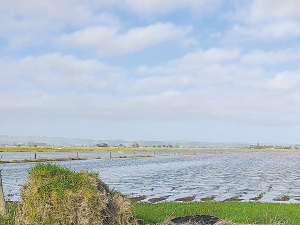$10 cucumbers?
OPINION: The Hound hears John Murphy, chair of Veg NZ, reckons greenhouse vege producers face severe challenges due to changes in the ETS.
 Flooded kumara on Ruawai kumara grower Warwick Simpson’s Northland property. He says growers are expecting higher than normal losses due to rotting in storage too.
Flooded kumara on Ruawai kumara grower Warwick Simpson’s Northland property. He says growers are expecting higher than normal losses due to rotting in storage too.
Kumara growers are bracing for more bad news as harvesting gets underway in flood-ravaged Northland.
With one-third of the 2023 crop already visibly dead and lost, the less visible loss of tubers rotting underground is about to become known.
Vegetables New Zealand director and Ruawai kumara grower Warwick Simpson told Hort News that this loss will become clearer as harvest progresses during the next few months. He says growers are also expecting higher than normal losses due to rotting in storage too.
Many farms in the kumara heartland of Ruawai and Dargaville were flooded for days as a result of Cyclone Gabrielle.
Simpson's farm at Ruawai was flooded for several days, with no electricity and internet connection. He says while there is still some post-cyclone cleanup going on, most growers are gradually settling back into business as usual and starting to harvest, albeit with a much reduced crop due to the flooding.
The most extreme flooding has resulted in obvious crop loss that can be seen in the dead plants – roughly a third of the industry’s crop, he told Hort News.
“But the harder part to quantify is the areas that were flooded to a lesser degree and left the plants alive but caused a large portion of the tubers to rot underground.
“This loss will become clearer as harvest progresses during the next few months, though we are also expecting higher than normal losses due to rotting in storage too.”
Simpson notes that the planting season was already very challenging due to the wet weather, with growers only managing to plant 70% of the usual area, before Cyclone Gabrielle did its damage.
Kumara growers are getting support from Northern Wairoa Vegetable Growers Association, Vegetables NZ and Horticulture NZ.
Simpson says they are aware growers were already in a challenging position due to record low prices for kumara last season. He says short-term recovery efforts are around grower welfare, and making sure they’ve got what they need to keep their business running.
An example is a recent grower lunch, provided by the Northland Collaboration Team. Representatives of Ministry for Primary Industries, Rural Support Trust, Kaipara District Council and others were present to offer advice and make sure growers are aware of the support available.
Simpson says for the slightly longer term, they are working on a seed contingency scheme.
“Normally growers would keep aside a portion of their harvested kumara to use as seed for next year’s crop, so this year’s shortage has a risk of causing a shortage next year due to lack of seed,” he explains.
“We’re working to make sure growers will have the seed they need to be able to provide the usual amount of fresh kumara next season.”
Simpson says the big challenge for growers will be keeping their business operating after their main source of income for the rest of the year has been significantly lost – up to 100% in some cases.
He points out that it will be important they get the necessary support, “so they can keep feeding New Zealanders, providing employment and supporting the local economy”.
The Meat Industry Association of New Zealand (MIA) today announced that Chief Executive Officer Sirma Karapeeva has resigned from the role.
The winners of the 2026 Hawke’s Bay/Wairarapa Dairy Industry Awards were announced at the annual awards dinner held at Copthorne Solway Park in Masterton on Thursday evening.
Environment Southland is welcoming this week’s decision by the Environmental Protection Authority (EPA) to approve the release of Blaptea elguetai, a leaf‑feeding beetle that will help control the highly invasive Chilean flame creeper.
This March, the potato industry is proudly celebrating International Women’s Day on 8 March alongside the International Year of the Woman Farmer, recognising the vital role women play across every part of the sector — from paddocks and packhouses to research, leadership, and innovation.
Fruit trader Seeka posted a record profit and returns to shareholders in 2025.
Recent weather events in the Bay of Plenty, Gisborne/Tairawhiti, and Canterbury have been declared a medium-scale adverse event.

OPINION: A mate of yours truly reckons rural Manawatu families are the latest to suffer under what he calls the…
OPINION: If old Winston Peters thinks building trade relations with new nations, such as India, isn't a necessary investment in…